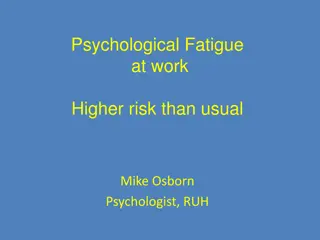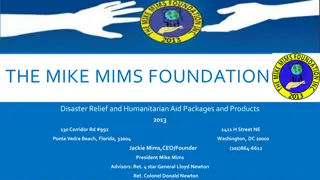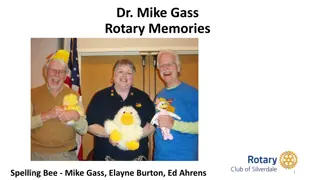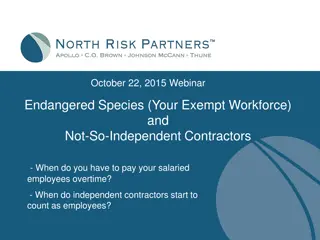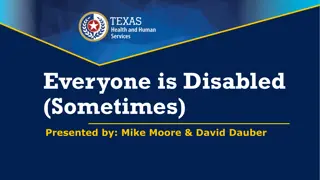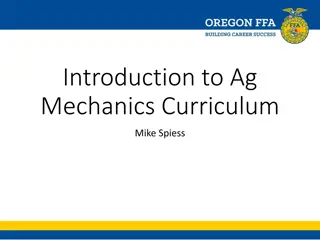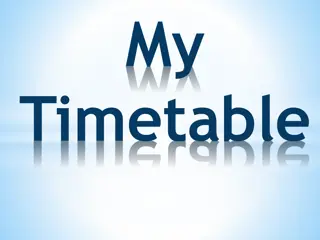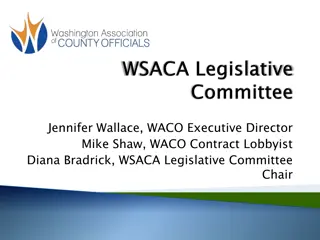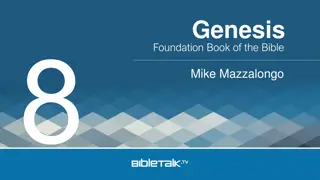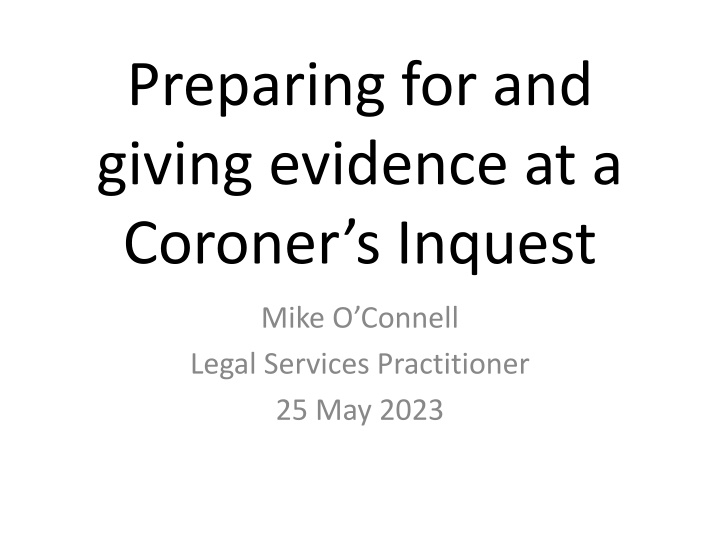
How to Prepare for Giving Evidence at a Coroner's Inquest
Learn valuable tips on providing a good witness statement, preparing for an inquest, understanding how an inquest works, giving effective evidence in court, and more. Get insights from a legal services practitioner with extensive experience in the NHS and coroners' offices.
Download Presentation

Please find below an Image/Link to download the presentation.
The content on the website is provided AS IS for your information and personal use only. It may not be sold, licensed, or shared on other websites without obtaining consent from the author. If you encounter any issues during the download, it is possible that the publisher has removed the file from their server.
You are allowed to download the files provided on this website for personal or commercial use, subject to the condition that they are used lawfully. All files are the property of their respective owners.
The content on the website is provided AS IS for your information and personal use only. It may not be sold, licensed, or shared on other websites without obtaining consent from the author.
E N D
Presentation Transcript
Preparing for and giving evidence at a Coroner s Inquest Mike O Connell Legal Services Practitioner 25 May 2023
Topics for today how to provide a good witness statement preparing yourself/your staff for an inquest how an inquest works in practice giving effective evidence in court inquest conclusions and links with Patient Safety Incident investigations For witnesses and those supporting them
The Disclaimer Not a lawyer But, Head of Legal Services 24 years NHS Acute Trust, maternity, 3 hospital sites, community services Well known to Trust senior medics and nurses, complaints manager, governance managers, and NHS Resolution case managers Plus 2 local coroners, and more!
Providing a good witness statement Request from Coroner s office/via Trust Access to records Trust guidance/template? Take time/care Attention to detail A good statement may mean that you do not have to give evidence.
Witness statement - content Patient details Full name, professional address, qualifications Purpose of statement Material viewed Job title and role Summary of involvement Context Chronology Statement of Truth Date and signature
Witness statement - chronology Set out what is gleaned from the records Detail your specific involvement In chronological order What you saw, what you did, what you asked others to do When referring to other staff, detail their names and roles Detail examinations, observations, investigations and their outcomes And when you last saw the patient
Witness statement - format Headed notepaper Not all one paragraph 2 or 3 lines per sentence 3 or 4 sentences per paragraph Numbered paragraphs Numbered pages Explain abbreviations/terminology
Preparing for the Inquest (1) Court location Travel Dress appropriately Familiarisation with statement/records Gap between events and hearing Length of hearing Rota/cover
Preparing for the Inquest (2) Addressing HM Coroner Jury? Press Support at inquest Case by case Informal hearing?!
Case study 1 67 yo female. Admitted via ED. Noted allergic to Penicillin (YAS + ED records). chest infection exacerbation of asthma. To MAU. Seen by FY1 on call. Requires IV antibiotics. No indication on clerking notes or prescription sheet of any allergies. FY1 prescribed + RN gave Amoxycillin. 5 minutes later patient collapsed CPR HDU ICU at tertiary centre. Died 5 days later. Coroner informed.
Case study 1 - process Incident Report SI RCA (within 6 weeks). Meeting with family - RCA shared. Inquest (8 months after death). Only lasted 2 hours. Misadventure. No Neglect rider. Family no questions, as RCA shared, so no surprises. No Reg 28/PFD announcement. Coroner satisfied that Trust s reaction to incident was swift and appropriate and a Reg 28/PFD announcement would serve no purpose. Claim (2 years after death). Letter of Claim NHSR. Liability admitted promptly. Settled within a year
Case study 2 43 yo male. To ED by Police. Picked up previous day for reasons of personal safety, mute, not eating, walked yesterday, not today. Seen by FY1. No letter from Police doctor. Attempts to obtain collateral history; Police surgeon not available. GP: h/o depression, cannabis use, alcohol problems. FY1 attempts to examine patient, who pushes doctor s arm away. Assessed by Psychiatric FY2: pulse 143, blood results = ?infection, recommends review by medics. Bed booked on MAU (5+ hours after arrival). Admitted to MAU (after 13 hours in ED), Medics noted right sided weakness. CT = acute subarachnoid haemorrhage tertiary centre. Died 10 days later.
Case study 2 - process Coroner informed. Incident Report (MAU SpR: Delay in accurate assessment delayed diagnosis and appropriate management, and delayed neurosurgical referral. Patient may have suffered harm because of this) SI RCA. IPCC investigation (of Police + ED). Over 18 months, interviewed circa 37 staff. Independent medical expert witness delays may have contributed to death 3 ED doctors + 2 Nurses in charge of shifts interviewed under caution at Police Station, potential gross negligence manslaughter charge.
Case study 2 - process To CPS (after 18 months) no criminal proceedings (almost a year later). GMC referral (3 doctors) + NMC (2 nurses). Inquest held 4 years after death (6 weeks + 2 days). Town Hall. 15 advocates (for family, FMEs, Police Officers, Chief Constable, Doctors, Trust). 61 witnesses (inc 5 statements read out). Narrative conclusion (6 pages typed A4). Medical cause of death: 1a Spontaneous Subarachnoid Haemorrhage 1b Ruptured Cerebral Artery Aneurysm. Discuss small breakout groups
The Inquest: Running order HM Coroner: Introduction Family Pathologist/Post-mortem Clinical staff (chronological order) Child Death Review lead? Safeguarding adults reviewer? Trust incident lead investigator Expert witness? Clinical reviewer/Prison governor?? Police??? HM Coroner: Summing up/Conclusion
Inquest: Giving evidence (Process) Behave professionally Switch off mobile phones Entering the witness box Swearing the oath HM Coroner/your statement Questions (family/lawyers) Release!
Remote participation in Coronial hearings Chief Coroner s Guidance 38: 11 June 2020 Already allowed - The Coroners (Inquest) Rules 2013 to improve the quality of the evidence given by the witness or allow the inquest to proceed more expediently HM Coroner must be in court = Partially remote hearing No broadcasting/livestreaming
Inquest: Giving evidence (remote) Quiet/private location Good Wi-Fi Appropriate background Have notes accessible Location is an extension of the court room Microphone on mute (unless speaking) Oath bring own religious text Arrangements agreed with Coroner s office
Inquest: Giving evidence (Practical tips) Take. Your. Time. Tell the truth Face HM Coroner Understand the question Brevity is okay Listen, consider, answer Be clear where you can be Speak clearly, slowly, loudly
Inquest conclusion Summing up Short-form (Accident; misadventure; suicide; natural causes; neglect; alcohol/drug related; unlawful killing; industrial disease; stillbirth; road traffic collision; open) Narrative Record of Inquest Reports to Prevent Future Deaths
What have we covered today? how to provide a good witness statement preparing yourself/your staff for an inquest how an inquest works in practice giving effective evidence in court inquest conclusions and links with Patient Safety Incident investigations
Further reading Guide to Coroner Services (MoJ) https://assets.publishing.service.gov.uk/government/uploads/sy stem/uploads/attachment_data/file/363879/guide-to-coroner- service.pdf Reports to Prevent Future Deaths Office of the Chief Coroner https://www.judiciary.uk/related-offices-and-bodies/office- chief-coroner/https-www-judiciary-uk-subject-community- health-care-and-emergency-services-related-deaths/ Coroners inquiries (MDU) https://www.themdu.com/guidance- and-advice/guides/coroners-inquiries Factsheets: Inquests (MPS) https://www.medicalprotection.org/uk/articles/inquests- england Inquests: a guide for health providers (NHS Resolution) https://resolution.nhs.uk/resources/inquests-a-guide-for- health-providers/





